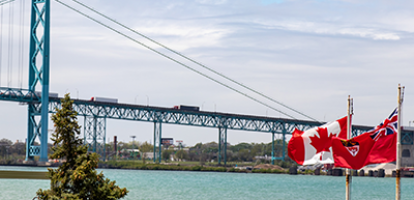From: Jon Johnson
To: Canadian Trade Watchers
Date: September 28, 2023
Re: Current Republican Thoughts on Trade
On August 22, former President Trump proposed a “universal baseline tariff” of 10 percent on virtually all imports to the United States. The rationale: “When companies come in and they dump their products in the United States, they should pay, automatically, let’s say a 10 percent tax … I do like the 10 percent for everybody.”
Fifty two years ago, Richard Nixon imposed a 10-percent tariff on all dutiable articles. The 1971 tariff, clearly intended to be temporary, was directed at a balance of payments problem and at encouraging certain US trading partners (particularly Japan) to revalue their currencies. Actions to safeguard balance of payments through restricting imports are permitted under GATT Article XII. Japan and Germany both revalued their currencies, and the 10 percent tariffs were withdrawn after just four months.
The US currently has a large trade deficit, though not as large in relative terms as in 1971. However, the Trump proposal makes no reference to the trade deficit but, rather, to “dumping”. The concept of dumping is well understood in US trade law, with procedures to ascertain whether imported goods are being dumped (i.e., sold below “normal value” or below cost) and antidumping duties are imposed if material injury results. However, “dump” is more likely Trump-speak for “unfairly traded,” and it is reasonable to think that in his mind such a tariff would be imposed on imported manufactured goods from most if not all countries, and perhaps some commodities as well. It remains unclear if he contemplates breaching the new(ish) Canada US Mexico Agreement before its 2026 review.
Meanwhile, Robert Lighthizer, Trump’s US Trade Representative, sets out his prescriptions for US trade policy in a new book. First, US trade remedy laws and Section 301 must be vigorously enforced. Second, the US must insist on reciprocity and limit access to the US market to countries that grant access to their market more beneficial than granted to the US.
Third, the US should penalize countries that manufacture products more cheaply by ignoring minimum standards in such areas as labour or the environment (such as through imposition of a carbon border tax). Fourth, the US should subsidize crucial industries like semiconductors. Finally, the US must achieve “balanced trade,” through tariffs being set at progressively higher rates until balance is achieved.
Mr. Lighthizer’s insistence on reciprocity is not new. In January 2019, Wisconsin Republican Sean Duffy introduced the United States Reciprocity Act (which never became law) that would have authorized the president to impose a duty equal to a foreign country’s tariff or non-tariff barrier. The idea of trade penalties for ignoring minimum standards has also been advocated by environmental groups and others. However, the emphasis on “balanced trade,” if enacted, would shatter the most-favoured-nation principle, one of the core principles of the WTO trading system. And while many Americans may not care much about WTO principles, they would care if other countries jettisoned them to achieve balanced trade with the US – countries such as Australia, the United Kingdom or Brazil, with which the US runs a trade surplus – or if it meant reduced imports of materials the US economy needs to sustain employment.
Mr. Lighthizer is mainly positive respecting the Biden administration’s approach to trade, which is not surprising given that the Biden administration has followed several Trump trade initiatives. The Lighthizer position on subsidies is consistent with the massive subsidies that the Biden administration is providing for electric vehicles under last year’s Inflation Reduction Act.
Adam Posen of the Peterson Institute for International Economics has called Trump’s proposal “lunacy” and “horrifying.” While that may be, Trump has a chance of becoming president again even with his legal travails.
It seems that once again, Canada could face the repercussions of a policy stance that would weaken the US and other North American economies, and overall global economic growth. Global Affairs Minister Mélanie Joly recently announced that Canada would work on a “game plan” in the event of a further rightward shift in US politics – including its economic consequences. It seems that Canada may need to dust off old playbooks, and refight very old fights, to minimize the consequences of potentially destructive US policies.
Jon Johnson is a former advisor to the Canadian government during NAFTA negotiations and is a Senior Fellow at the C.D. Howe Institute.
To send a comment or leave feedback, email us at blog@cdhowe.org.
The views expressed here are those of the author. The C.D. Howe Institute does not take corporate positions on policy matters.





